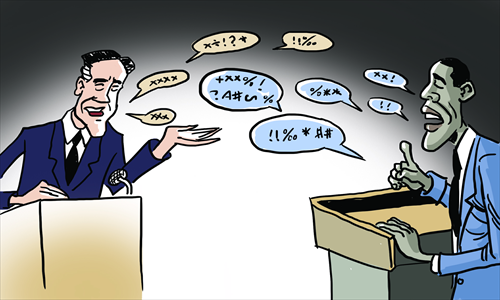Self-interest, China dominate second US presidential debate

Us President Barack Obama solved his rhetorical problems on Tuesday night. Unlike the first presidential debate, Obama came out swinging and never stopped critiquing his opponent Mitt Romney. Obama was particularly effective explaining where Romney's proposals don't make sense and where they contradict his previous statements and record as governor of Massachusetts.
The debate was in a "town hall" format: The candidates responded directly to questions from the audience, supposedly composed of average Americans who are undecided voters. This format emphasizes some of the problems with American democracy.
Half of the questions focused on the immediate problems of the person asking them: gas prices, job prospects or tax reductions for the middle class. American ideology actually encourages this kind of self-interested perspective: Competition is supposed to solve all social problems and voters are supposed to think of the president in terms of what he can do for them, not the larger society.
Romney tried to take advantage of this self-interested slant. He attacked Obama's commitment to environmental protection, suggesting that Americans will have more and better jobs and cheaper energy if US industry can have free reign over its operations, unimpeded by the requirement to limit pollution. This kind of argument asks voters to ignore more distant concerns like environmental degradation or global warming.
Romney's more general strategy was to continually reiterate negative economic indicators - high unemployment, rising gas prices, slowed economic growth - in an effort to encourage voters to focus only on immediate circumstances. At one point, Romney went so far as to suggest that voters only needed to know one thing in order to understand the complex economic problems the US faces: that gas prices have gone up.
This focus on short-sighted goals reflects a kind of intellectual helplessness that is perhaps exacerbated by the effort to appeal to undecided voters, who tend to know less about the issues than other Americans.
The privileged place of self-interest in the American system is also why there was so little discussion of foreign policy in this debate, despite the fact that it was supposed to cover both domestic and international topics.
The only exception, besides some accusations about the attack on the American embassy in Benghazi, was discussion of China. This makes sense given that China is now an intrinsic part of the American economy.
Both candidates advertised their commitment to "cracking down on China when they cheat" as Romney said. When American politicians talk about China "cheating" in economic matters, they are referring to Chinese protectionist policies, infringement of American patents and intellectual property rights, and currency manipulation - the idea that China artificially devalues its currency so that its products are much cheaper on the American market. When the candidates talk about creating a "level playing field," they mean that they want to create an international currency situation that will make American products equally cheap and therefore competitive.
Romney particularly focuses on currency manipulation and tax structure, arguing that he can take manufacturing back to America by lowering corporate taxes and thus enticing companies to return to the US. He claims he will "make America the most attractive place in the world for entrepreneurs."
The problem with this kind of argument is that it ignores the primary reason that Southeast Asia is an attractive place for companies to set up business thanks to cheaper labor. Cut taxes as much as you want and it will never make up for the disparity between the expectations of American workers and the low rates of pay in other places around the world, which is the primary reason that Chinese products are cheaper and the primary reason that American companies have taken their manufacturing away from the US.
Neither candidate wants to address this issue or the idea that Americans are responsible for their own economic problems, because they insist on buying cheaper goods, wherever they're made. Neither do they want to talk about the protection of US workers' rights and wages: Obama cannot appear overly pro-union and Romney cannot appear overly anti-worker.
Romney has a further problem in negotiating the issue of trade with China. However much Romney talks about imposing tariffs on China, about the "level playing field," or about "currency manipulation," and however much he tries to avoid talking about companies taking advantage of cheap labor, it cannot erase the fact that in his previous career as a businessman he made millions of dollars liquidating American companies and sending their work overseas.
The author is a PhD candidate in Ohio State University. opinion@globaltimes.com.cn